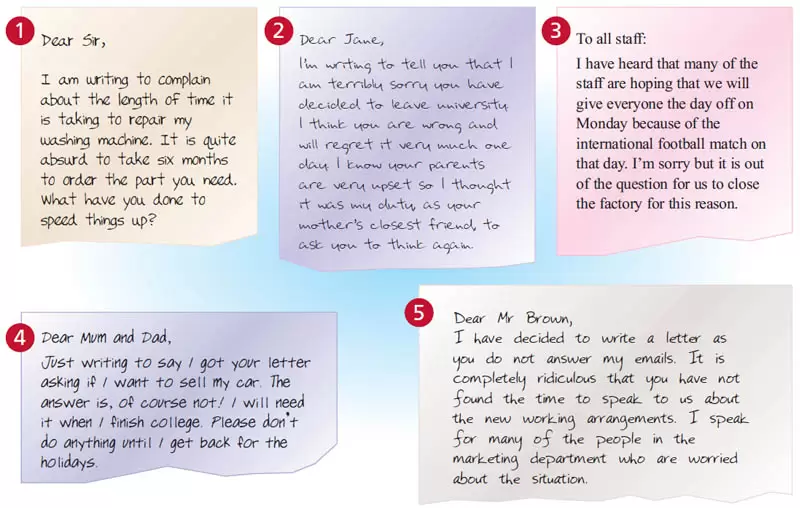Agora que você já sabe discordar, que tal dar ainda mais ênfase? No inglês algumas expressões servem justamente para isso! Vamos aprender, junto com expressões de quantidade!
1 . Às vezes você tem de deixar claro para as pessoas que realmente discorda delas. Leia os trechos de algumas cartas abaixo e anote as frases que expressam uma forte discordância.

2 . Quem escreveu as cartas? Relacione-as com as pessoas abaixo.
.webp)
3 . Leia as cartas novamente com atenção e faça a correspondência correta
entre as declarações (a-e) e cada uma das cartas do exercício 1.
a) I don’t want you to do this.
b) It’s taking too long to do this.
c) I can’t permit this to happen.
d) We want you to talk to us about this.
e) I want you to change your mind about this.
Grammar: much of and many of
Algumas quantidades são usadas com the seguido por um substantivo. Much é usado com substantivos incontáveis e many com os contáveis.
Many of his colleagues were away from work with flu.
Much of the work was done by people in other departments.
4 . Encontre dois exemplos de many seguido por the e um substantivo nas cartas do exercício 1.
5 . Complete as frases abaixo com much of the ou many of the.
1 I think that ………………… time he sits in his room watching television.
2 Have you read ………………… books on this reading list?
3 He wants to know how ………………… cost he will have to pay himself.
4 Do ………………… people in this town travel by bus?
5 They say that ……………… world will be short of water in a few years’ time.
6 I think it’s absurd that ………………… shops are closed on Sundays.
20 minutes+
Anote onde você acha que a ênfase da pronúncia vai recair nas frases abaixo. Confira suas respostas na gravação.
1 You know it’s completely ridiculous!
2 I’m afraid it’s out of the question for you to go to the concert.
3 Of course not! There’s no way he can work in that factory.
4 You’ve got to be wrong about this.
5 I don’t believe it!
6 It’s quite absurd to think he can become a film star.
Word Bank
absurd (adjetivo) = absurdo
duty (substantivo) = dever
permit (verbo) = permitir
reading list (substantivo) = lista de leituras
regret (verbo) = arrependerse, lamentar
upset (adjetivo) = magoado, chateado
Respostas:
Exercício 1
1 It is quite absurd …
2 I am terribly sorry … ; … I think you are wrong and will regret it very much …
3 … it is out of the question …
4 … of course not! … Please don’t do anything …
5 It is completely ridiculous …
Exercício 2
1 customer
2 family friend
3 manager
4 son
5 employee
Exercício 3
1-b; 2-e; 3-c; 4-a; 5-d
Exercício 4
3 many of the staff
5 many of the people
Exercício 5
1 much of the
2 many of the
3 much of the
4 many of the
5 much of the
6 many of the
20 minutes+
1 You know it’s completely ridiculous!
2 I’m afraid it’s out of the question for you to go to the concert.
3 Of course not! There’s no way he can work in that factory.
4 You’ve got to be wrong about this.
5 I don’t believe it!
6 It’s quite absurd to think he can become a film star.
 Sair da aula
Sair da aula